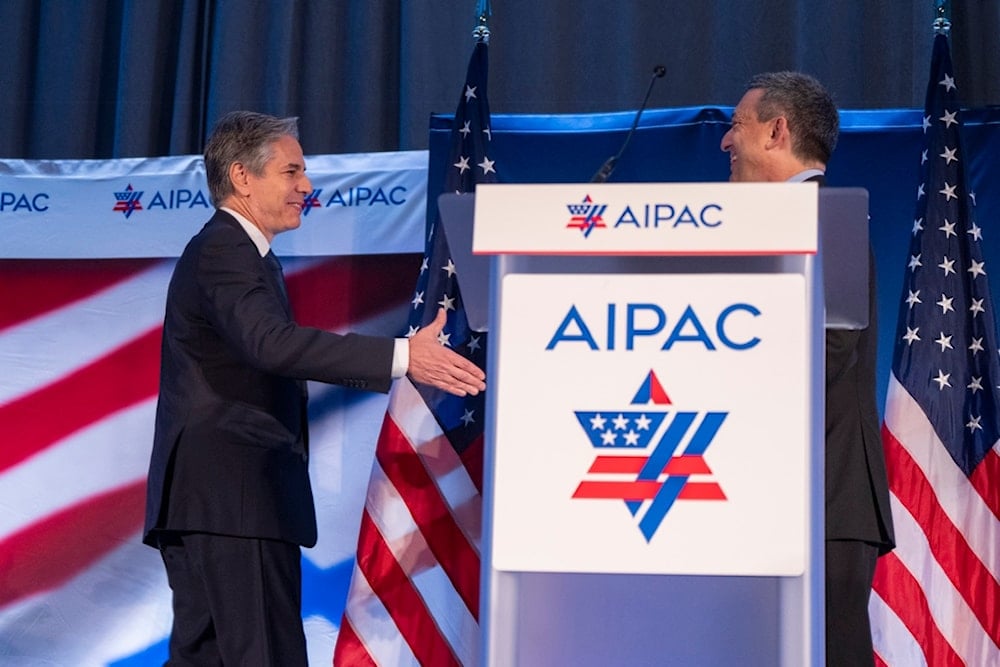AIPAC heavily influences US lawmakers' 'Israel' perspectives: Politico
A Politico piece sheds lights on the impact of AIPAC’s lobbying efforts, which critics argue contribute to a one-sided US approach to Middle Eastern policy.
-

Secretary of State Antony Blinken shakes hands with AIPAC President Michael Tuchin before delivering remarks at the 2023 AIPAC Summit, on Monday, June 5, 2023, at the Grand Hyatt in Washington. (AP)
An investigative piece, published by Politico on Wednesday, detailed the powerful influence of the American-Israel Public Affairs Committee (AIPAC) in shaping the perspectives of US lawmakers on "Israel".
Conducted in partnership with the Howard Center for Investigative Journalism at the University of Maryland, the report reveals the extent to which AIPAC-sponsored trips to "Israel" have dominated privately funded international travel for members of Congress.
Since 2012, more than a quarter of all privately sponsored foreign trips reported by House members and their staff have been to "Israel", funded primarily by AIPAC's nonprofit arm, the American Israel Education Foundation (AIEF).
Through these trips, AIPAC has sought to bolster support for "Israel" by offering lawmakers a heavily pro-"Israel" itinerary, often aligned with the policies of Prime Minister Benjamin Netanyahu.
The investigation shows that these visits are carefully curated, featuring meetings with high-profile Israeli officials and presentations on "Israel's" security needs but offering limited engagement with Palestinian voices or perspectives on the broader occupation of Palestine.
Unbalanced views
Politico's report sheds light on the impact of AIPAC's lobbying efforts, which critics argue contribute to a one-sided US approach to Middle Eastern policy.
Former Rep. Andy Levin, a critic of AIPAC's strategy, notes that these trips can lead to an unbalanced view of US- "Israel" relations and the occupation, particularly given AIPAC's alignment with conservative Israeli policies.
AIPAC's influence extends beyond travel, with the organization's super PAC spending millions on campaigns, including $6 million to support Rep. Glenn Ivey (D-Md.) in his 2022 election.
Critics also raise concerns that the heavy focus on "Israel" sidelines attention to other crucial global regions, a perspective echoed by former lawmakers like Rep. Brian Baird, who highlighted the lack of attention to the western hemisphere and Asia.
Read more: AIPAC's massive spending in US elections exposed in new report
While alternative organizations like J Street and Rebuilding Alliance offer congressional trips with more focus on Palestinian issues, they have a smaller presence and influence compared to AIPAC.
AIPAC, in a written statement, defended its travel program as educational, promoting bipartisan understanding of the US-"Israel" relationship.
The trips, AIPAC said, offer lawmakers "a unique perspective on challenges facing the US and our ally Israel."
However, Politico's report raises questions about the effects of this single-narrative exposure, especially as the US continues to debate its support for "Israel" amid ongoing provocations.
Debating support for 'Israel'?
While the report notes that the US is considering limiting its support for "Israel" amid heightened regional tensions, there are clear indications that it may be deliberately leaning toward an escalated stance against Iran.
Since the Gaza war began on October 7, 2023, the US has provided "Israel" with an estimated $17.9 billion in military aid—marking the largest single-year allocation of support.
This aid has included financial assistance, expedited arms shipments, and resources from US stockpiles in "Israel," such as artillery shells, precision-guided munitions, and bunker-buster bombs.
Additionally, around $4 billion was allocated to bolster "Israel's" missile defense systems, including the Iron Dome and David's Sling, alongside smaller items like rifles and jet fuel.
The US continues to supply "Israel" with arms despite the reported civilian death toll exceeding 40,000 in Gaza.
Beyond arms and financial support, the US has deployed military assets across the region to protect "Israel".
Read more: US boosts military personnel in Middle East by 17%

 4 Min Read
4 Min Read








